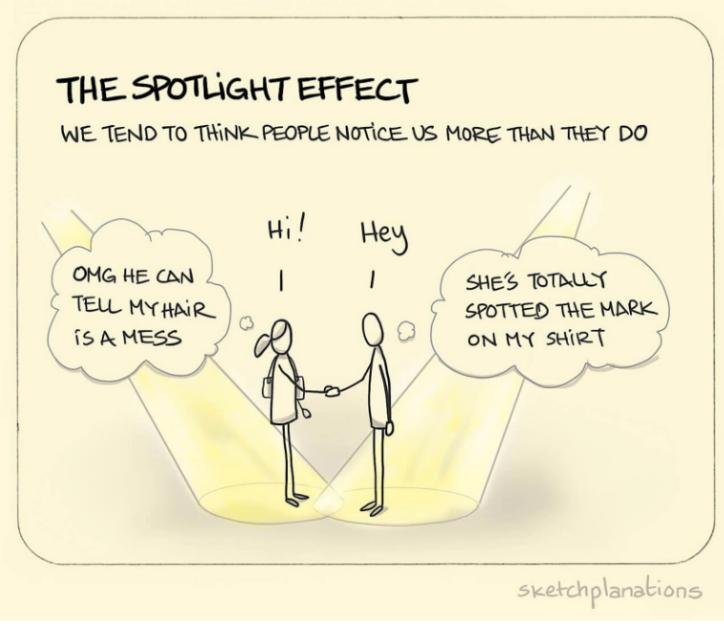Stepping out of the Spotlight: Strategies for Reducing Social Anxiety
 (https://parade.com/living/spotlight-effect)
(https://parade.com/living/spotlight-effect)
Have you ever felt scared to raise your hand in class or do you feel like everyone is looking at you when you walk around? Well, maybe you are experiencing the “Spotlight Effect”.
What does the spotlight effect mean? In psychology, the spotlight effect is a phenomenon where people tend to overestimate how much others notice aspects of one’s appearance and or behavior. If you’re still confused about what this spotlight effect is like, here are some examples of it. When somebody says something incorrectly during a conversation, the spotlight effect will cause them to think that everyone judges them. Another example is an employee might be afraid to propose new ideas and opinions during meetings, brainstorming sessions, or presentations, worrying that others will think the ideas and opinions are impractical or silly.
Now, you might wonder “Why does this spotlight effect happen?”. The spotlight effect is actually one type of cognitive distortion known as egocentric biases. This type of cognitive bias twists our way of seeing things by causing us to rely heavily on our own points of view rather than considering others’ perspectives as well. The spotlight effect is also driven by another cognitive bias called anchoring. First created by Amos Tversky and Daniel Kahneman, the two founding fathers of behavioral economics, anchoring is the moment where we rely so much on the information we receive in the early process when we are deciding. The relation of anchoring to the spotlight effect is when we are making judgments about social situations, we become anchored to our own perspective since we have direct access to it. Lastly, we notice our changes in appearances or behaviors more than others do. When we do something differently than usual, we think people must be as fixated on it as we do.
There are several impacts of the spotlight effect besides causing people to feel observed by others all the time. First, decrease in authenticity. When we feel in the spotlight, we tend to behave in ways that we think others expect us to. We will feel uncomfortable doing this since we do it to fulfill others’ expectations that might be not real. Second, self-doubt and insecurity. Since the spotlight effect can cause people to focus too much on others’ thoughts, they will start to lose their self-esteem and feel inadequate or inferior. Third, self-centered. Having the spotlight effect causes you to ask people a lot about your appearance or behavior. People might feel you only care about yourself.
Many people experience social anxiety co-occur with the spotlight effect. Researchers have found that those with social anxiety disorder experience an increase in the spotlight effect symptoms. They will be more aware of their changing behavior or appearances and highly concerned about others’ judgments which leads them to avoid social interactions. Social anxiety is more than just nervousness. It indicates differences in brain activities and interactions with our environment. When experiencing social anxiety, we might be aware that we are being irrational, but we can’t do much about it or change how we feel.
The spotlight effect can affect our daily lives if we don’t tackle it. Here are some ways to reduce the experience of the spotlight effect on us.
- Understand that you’re not the center of attention all the time. If we mostly focus on ourselves, others will too. Having confidence in ourselves also helps us to be less self-conscious about our behavior and or appearance and focus on more important aspects of our lives, like relationships and careers.
- Pay attention to others. In social situations, it’s easy to get caught up in our own thoughts and feelings. To avoid this, we can practice the active listening method so that we can focus more on others.
- Take control of your emotions. What others think about us doesn’t determine our self-worth. Being our authentic self is very fun and it helps us to be more honest about our feelings and opinions.
References:
- https://www.cabrini.edu/blog/2020-2021-blogs/reducing-social-anxiety-the-spotlight-effect#:~:text=There%20is%20something%20in%20psychology,of%20one’s%20appearance%20or%20behavior.
- https://thedecisionlab.com/biases/spotlight-effect
- https://parade.com/living/spotlight-effect
- https://www.verywellmind.com/what-is-the-spotlight-effect-3024470#:~:text=Impact%20of%20Spotlight%20Effect&text=This%20tendency%20can%20cause%20you,this%20exaggerated%20sense%20of%20significance.
- https://www.betterup.com/blog/spotlight-effect#:~:text=The%20spotlight%20effect%20is%20a,self%2Dconsciousness%20and%20social%20anxiety.



